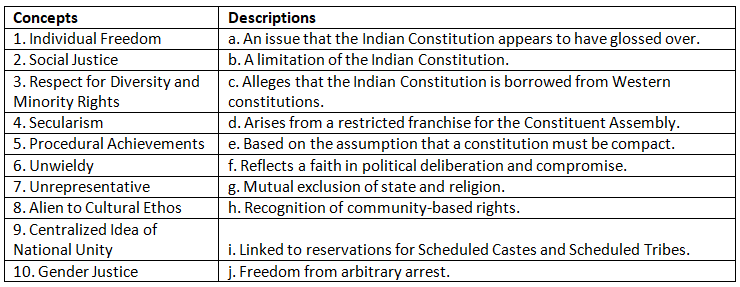Worksheet: The Philosophy of Constitution | Political Science Class 11 - Humanities/Arts PDF Download
| Table of contents |

|
| Fill in the Blanks |

|
| Match the Column |

|
| Assertion and Reason Based |

|
| Very Short Answers Type Questions |

|
| Short Answers Type Questions |

|
| Long Answer Type Questions |

|
Fill in the Blanks
Q1: The Indian Constitution was designed to break the shackles of traditional _______.
Q2: The concept of _______ means mutual exclusion of state and religion.
Q3: The Indian Constitution grants rights to all _______ to establish and maintain their educational institutions.
Q4: The first point to note about the Constitution is its commitment to _______.
Q5: The Indian Constitution is criticized for being _______.
Q6: The voice component of representation in the Indian Constitution is questioned due to the _______ franchise.
Q7: The Indian Constitution is often criticized for being entirely an _______ document.
Q8: The Indian Constitution emphasizes peaceful and _______ measures for implementing its philosophy.
Q9: The Indian Constitution encourages equal respect between _______.
Q10: The Indian Constitution includes many details, practices, and statements, making it somewhat large in size, which leads to criticism of it being _______.
Match the Column
Q1: Match the concepts on the left with their corresponding descriptions on the right.

Assertion and Reason Based
Q1: Assertion: The Indian Constitution is often criticized for being unwieldy.
Reason: This criticism is based on the assumption that a country's constitution should be a compact document.
(a) Assertion is true, but the reason is false.
(b) Both the assertion and reason are true, and the reason is the correct explanation of the assertion.
(c) Assertion is false, but the reason is true.
(d) Both the assertion and reason are false.
Q2: Assertion: The Indian Constitution is criticized for being unrepresentative.
Reason: The members of the Constituent Assembly were chosen by a restricted franchise, not by universal suffrage.
(a) Assertion is true, but the reason is false.
(b) Both the assertion and reason are true, and the reason is the correct explanation of the assertion.
(c) Assertion is false, but the reason is true.
(d) Both the assertion and reason are false.
Q3: Assertion: The Indian Constitution is criticized for being alien to the cultural ethos of the Indian people.
Reason: Some voices in the Constituent Assembly echoed this concern.
(a) Assertion is true, but the reason is false.
(b) Both the assertion and reason are true, and the reason is the correct explanation of the assertion.
(c) Assertion is false, but the reason is true.
(d) Both the assertion and reason are false.
Q4: Assertion: The Indian Constitution emphasizes peaceful and democratic measures for implementing its philosophy.
Reason: It reflects a faith in political deliberation and a spirit of compromise and accommodation.
(a) Assertion is true, but the reason is false.
(b) Both the assertion and reason are true, and the reason is the correct explanation of the assertion.
(c) Assertion is false, but the reason is true.
(d) Both the assertion and reason are false.
Very Short Answers Type Questions
Q1: What does the Indian Constitution emphasize in terms of individual freedom?
Q2: How does the Indian Constitution address the issue of social justice?
Q3: What is the main idea behind the concept of secularism in the Indian Constitution?
Q4: Why is the Indian Constitution criticized for being unwieldy?
Q5: Explain the voice component of representation in the Indian Constitution.
Q6: Why is the Indian Constitution criticized for being unrepresentative?
Q7: What is the key criticism regarding the cultural compatibility of the Indian Constitution?
Q8: How does the Indian Constitution promote respect for diversity and minority rights?
Q9: What is the central idea of national unity in the Indian Constitution?
Q10: What is one limitation of the Indian Constitution in terms of gender justice?
Short Answers Type Questions
Q1: Describe the Indian Constitution's approach to individual freedom and provide an example.
Q2: Explain the relationship between social justice and the provisions for Scheduled Castes and Scheduled Tribes in the Indian Constitution.
Q3: Define the concept of secularism in the Indian Constitution and how it differs from the western conception.
Q4: What are the criticisms regarding the representation in the Indian Constitution, considering voice and opinion components?
Q5: Discuss the argument that the Indian Constitution is an alien document, and explain the concerns raised in this regard.
Q6: What are the procedural achievements reflected in the Indian Constitution, and how do they relate to political deliberation and compromise?
Q7: What is the central idea of national unity in the Indian Constitution, and why is it considered a limitation?
Q8: How does the Indian Constitution address the issue of gender justice, and what shortcomings are observed in this regard?
Long Answer Type Questions
Q1: Explain the significance of individual freedom in the Indian Constitution, providing historical context and examples of its implementation.
Q2: Discuss the Indian Constitution's approach to social justice and its link to reservations for Scheduled Castes and Scheduled Tribes. How does this approach differ from classical liberalism?
Q3: Analyze the concept of secularism in the Indian Constitution, contrasting it with the western conception. How does the Indian Constitution balance religious freedom and state intervention?
Q4: Assess the criticisms of the Indian Constitution, including its alleged unwieldiness, lack of representation, and cultural compatibility. Provide a comprehensive overview of these criticisms and their implications.
You can access the solutions to this worksheet here.
|
43 videos|268 docs|39 tests
|
FAQs on Worksheet: The Philosophy of Constitution - Political Science Class 11 - Humanities/Arts
| 1. What is the significance of the Constitution in a democratic society? |  |
| 2. How does the Constitution promote social justice? |  |
| 3. What role do amendments play in the Constitution? |  |
| 4. How does the Constitution protect the rights of minorities? |  |
| 5. In what ways does the Constitution ensure the separation of powers? |  |















